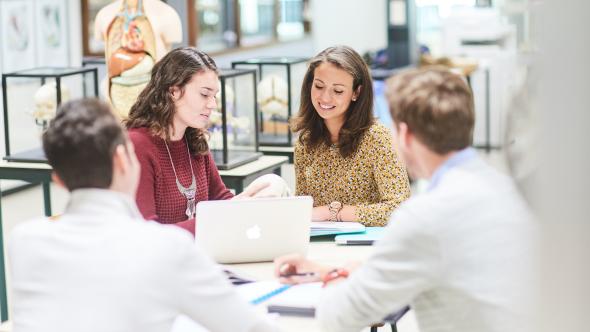In 2021, Hélène Givron, Alice Schittek and Martin Desseilles, lecturers at the University of Namur, drew some conclusions about student health (Givron & Desseilles, 2021[1]). On the one hand, they observed a close link between medical students' emotional and communication skills. For example, the ability to address sensitive topics such as death requires adequate emotional management to communicate effectively with patients' families. On the other hand, it has been observed that students are facing heightened malaise, which has intensified with the Covid-19 pandemic.
Based on these findings, teachers have suggested setting up a 15-hour TP focusing on student well-being. This one is held mainly in a preventive approach and gives tools to maintain mental, social and physical well-being. The topics covered are wide-ranging, from nutrition and healthy living to relaxation. The aim is to foster positive health among students so that they can better meet the needs of their future patients.
This TP, as a psycho-educational intervention implemented in the Faculty of Medicine at the University of Namur, has been the subject of a study by Alice Schittek, Hélène Givron and Martin Desseilles. It revealed encouraging results, recently published in the journal Pédagogie Médicale. The scientific research aimed to assess the impact of PT on students' well-being. To do this, the researchers chose to carry out their analysis in three branches of the Faculty of Medicine: pharmaceutical sciences, biomedical sciences and medicine. Medical students formed the experimental group, who would receive the wellness sessions. Pharmaceutical and biomedical students, on the other hand, formed the control group, continuing their studies without the TP. The results are quite evocative. "A 15-hour psycho-educational intervention appears to have positive effects, mitigating increased levels of stress, depression and burn-out, improving perspective-taking ability (identifying and possibly taking into account the point of view of others) in medical students.", conclude the UNamur researchers. These factors were assessed using a test that students were asked to complete before and after the PT sessions. These questionnaires measured their scores for stress, depression, student burn-out, emotional skills, perceived social support and empathy.
Thanks to their study, Hélène Givron, Alice Schittek and Martin Desseilles were able to highlight the advantage of integrating such a psycho-educational initiative right from the start of the university curriculum. In addition to the quantitative study, qualitative interviews were conducted with students to refine the content and form of the workshop in future years. The complement to the study will be published shortly.
This wellness workshop represents a valuable initiative to train more balanced and resilient doctors, ready to meet the challenges of their profession while taking care of themselves.
[1] Givron, H., & Desseilles, M. (2021). The role of emotional competencies in predicting medical students' attitudes towards communication skills training. Patient Education and Counseling, 104(10), 2505-2511.
